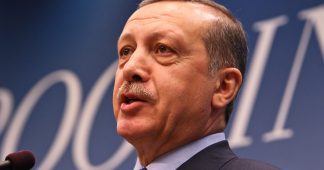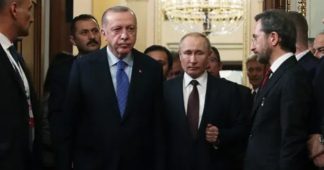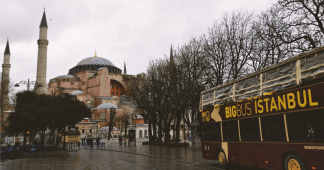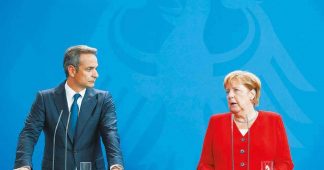By Prof. William Mallinson
Athens, 4 October 2021
Only the other day, in the continuing pseudo-high-low poker game between Turkey and Greece, the Turkish Foreign Minister said the following: ‘We are not a country that responds to Greece every day, we are not a country with a complex’. He was clearly implying that Greece has a complex. Let us however look at Turkey, quoting, inter alia, an intelligent British ambassador.
Turkish Nationalism and Identity
Perhaps one of the most important components of both nationalism and identity is language. It seems that apart from being a good Kemalist Turk, it was necessary to adopt European ways as much as possible, as part of the new Turkey that appeared in 1923. The Turkish tribes had easily adopted the Moslem religion, and their language was heavily influenced by Arabic and Persian, both in terms of vocabulary and use of the Arabic script. The Young Turks had already initiated the process of ‘westernisation’, but Ataturk plunged in with a vengeance: on 1 January 1929, all official documents had to be written in a slightly modified Roman alphabet. As one Turkish academic said, the Turks became illiterate overnight.[1] Ataturk then proceeded to claim that all languages were descended from Turkish, the ‘sun language’. The British Ambassador in Ankara in 1936 presented a more realistic picture:
The theory, which I am privately informed on the best expert authority, is entirely devoid of a scientific basis, is personally sponsored by Kamal Ataturk, whose interest in it is sufficient to explain the enthusiasm by which it was expounded by Turkish delegates to [the Third Turkish Language] Congress, and the tactful silence of the foreign scholars.[2]
Thus, the effort to create a new Turkish state included some pretty rum linguistic gyrations, which detract from natural linguistic development. For example, apart from the absurd claim above, many Arabic and other words were banned, and replaced with oddities, for example ‘tuvalet’ (an attempt to copy the French word ‘toilette’. Such was the linguistic result of Ataturk’s nationalistic ‘Turkey for the Turks’ dictum.
Turkish has nevertheless survived the artificial manipulation, whether it is the mother of all languages or not. The switch to a Roman-based alphabet obviously subliminally influenced many educated Turks into handling their language in a more European way than hitherto. The question now therefore arises as to whether Turks see themselves as Asian, European or neither. Again, a British ambassador helps us:
Leaving aside Istanbul and Izmir and the Aegean littoral, for my money Turkey is more of the Near East and Asia than Europe. Not just physically, with 97 per cent of its territory in Asia, but temperamentally. Politically of course, so far as the central direction if affairs is concerned, it looks to Europe and sees itself as Europe and wants others to see it so – which indeed they have done: what British schoolboy has not heard of the Sick Man of Europe? Atatürk taught that the European West was the only civilisation; and whatever the erosion of his influence since his death nearly forty years ago, that precept has continued to govern Turkish national policies. Perhaps this deliberate cultivation of a Western outlook, with all that it means in education, has led the ruling circles and intellectuals and industrialists to regard themselves as truly European, and Turkey in general as Western. Admittedly there are European ethnic strains in the people, but not so strong as the Asian. And their singular language is Central Asian in origin. There is no natural reason why the Turks should be so insistent on their European connexion. It is largely the dictum of Kamal Atatürk that makes them.[3]
The ambassador also wrote specifically, and somewhat critically, about Ataturkism:
Republicanism and nationalism are today still not in question […] It is perhaps his principle of secularism that offers most scope today for controversy. While not interfering with religion as a matter of personal belief, he ruthlessly did away with all outward symbols of Islam. The resulting deep confusion of personal values, particularly in the vast country areas, still lingers, and politicians have always been alive to the opportunities. Consequently the appeal to religious feeling is an inescapable part of the democratic process in Turkey […] The very qualities for which the Turk is perhaps most renowned – tenacity, stubbornness, lack of imagination, and that curious mixture of inferiority and superiority complex – have helped to preserve Ataturkism.[4]
Despite Ataturk’s dictum on Turkey for the Turks, Turkey is not as homogeneous demographically or psychologically as Greece, the mainly Sunni Moslem religion being the only almost common factor. Comparatively a young state, it is still Ataturkism that holds society together, along with Mohamedanism. To many, this can lead to Steppenwolfish problems. Ataturkism represents the civilised aspects of Europe, while religion is the underpinning of the past. Modern Greece, as an older country, albeit with its modern foreign influences, was not founded on copying others to the same extent as Turkey. And, perhaps paradoxically, many of the things that modern Greece apes were introduced to Europe from ancient Greece, through the Renaissance.
The Turkish Foreign Minister should desist from making thoughtless statements about Greece, and study his own country.
Prof. William Mallinson
Universitá Guglielmo Marconi
Author of Guicciardini, Geopolitics and Geohistory: Understanding Inter-State Relations.
[1] Media Seminar on Research Methods, Daphni, Greece, 7 November 2006. Sponsored by the Greek Ministry of Culture.
[2] Morgan to Eden, 18 September 1936, NA-FO 371/20094, file E 5890, despatch, in op. cit., Mallinson, Cyprus, A Modern History, p. 108.
[3] Phillips to Secretary of State, NA-FCO 9/2669, file WST 014/1, part B, 31 May 1977, Diplomatic Report No. 215/77, in Mallinson, William, Britain and Cyprus, I.B. Tauris, London and New York, 2011, p. 178.
[4] Ibid., Mallinson, Phillips to Secretary of State, 23 February 1977, NA-FCO 9/2668, file WST 014/1, part A, Diplomatic Report No. 156/77.
We remind our readers that publication of articles on our site does not mean that we agree with what is written. Our policy is to publish anything which we consider of interest, so as to assist our readers in forming their opinions. Sometimes we even publish articles with which we totally disagree, since we believe it is important for our readers to be informed on as wide a spectrum of views as possible.











